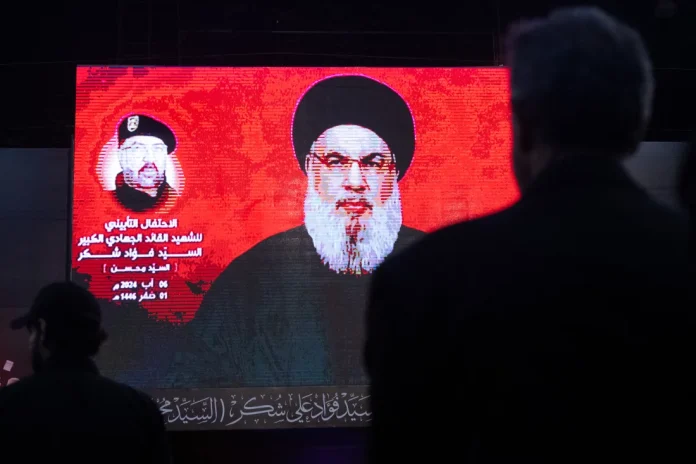In a statement on Saturday, Hezbollah confirmed the death of the group’s leader Hassan Nasrallah and expressed condolences for the deaths of others who died with him in the latest major airstrike by the Israeli military.
In a post on social media platform X, the Israeli military wrote that Nasrallah would “no longer be able to terrorise the world.” Afterwards, loud music was played throughout the capital of Israel in celebration of his death. In turn, the Lebanese capital Beirut saw gunfire after Hezbollah announced the death of its leader. The gesture is regarded as a mark of martyrdom, which Muslims consider one of the highest honours in Islam.
The death of the group’s leader was another significant development in a conflict that has spread across the Middle East since last October. Besides, Israel’s killing of the Hezbollah leader has heightened fears of a full-fledged war in the Middle East, which US President Joe Biden’s administration has been desperately seeking to avert for months, current and former US officials say.
The statement from Hezbollah’s leader on Saturday added that the group’s senior military commander in the region close to Lebanon’s border with Israel was also killed.
Lebanon’s health ministry announced late Friday night that the strikes killed six people and injured more than 90, but authorities said they were still clearing a huge amount of rubble, meaning those numbers were likely to rise. Israeli airstrikes continued in Beirut’s southern suburbs and elsewhere in Lebanon on Saturday morning. The Israeli military said reserve troops would be mobilised near the border with Lebanon, for a further ground invasion of southern Lebanon.
Wider conflict risks
Senior Hezbollah leaders sought to escape a full-fledged war with Israel, even as the fighting intensified in recent months, according to the officials. However, the assassination of Nasrallah was another matter entirely, as Hezbollah now runs a huge risk of losing legitimacy in the eyes of its fighters and supporters if the group does not offer a maximum response to the killing of its leader.
Jonathan Panikoff, a former senior intelligence official specialising in the region, said the group would almost certainly respond. Iran, in turn, would play its part and support ally, as Tehran was alarmed at the extent of the damage Israel was inflicting on Hezbollah, its most powerful and capable group in the region.
A senior US official said there was a high probability of Iran becoming directly involved in the conflict if Hezbollah were to weaken rapidly. The reason given is that the cumulative effect of Israel’s operations against Hezbollah has already taken hundreds of fighters off the battlefield, according to the official and another person familiar with the intelligence.
Mick Mulroy, a former senior Middle East official at the Ministry of Defence, said the strike also sent a clear signal that Israel was preparing to risk a wider conflict and that it was no closer to accepting the US-backed ceasefire offer. Hezbollah is also now unlikely to be interested in negotiations.
Hezbollah’s allies share condolences
Apart from, Hamas issued a statement expressing condolences and solidarity with Hezbollah over the death of its leader Hassan Nasrallah and a number of the group’s senior officials. Hezbollah and Hamas are part of a larger alliance of militant groups led by Iran, spanning Yemen, Syria, Gaza and Iraq. Hamas said in a statement:
“Crimes and assassination by the occupation will only increase the determination and the insistence of the resistance in Palestine and Lebanon to go forward with all their might, bravery and pride on the footsteps of the martyrs…and pursue the path of resistance until victory and the dismissal of the occupation.”
The Islamic Jihad in Palestine echoed Hamas’ sentiments, mourning the loss of the Arab and Islamic figure who set the path to victory for the nation. They said his death would further strengthen the resistance in Lebanon, Palestine and the region.
Sooner or later, the resistance forces in Lebanon, Palestine, and the region will make the enemy pay the price of its crimes, and taste defeat for what its sinful hands have done, according to the Islamic Jihad in Palestine.
The Axis of Resistance thus brings together groups including Hezbollah, backed by Iran, that have been attacking Israel since the war between their ally Hamas and Israel began on 7 October. The Israeli offensive resulted in the deaths of more than 41,500 people. The majority of the population of Gaza had been internally displaced because of the war.
“We reaffirm our absolute solidarity and standing with the brothers in Hezbollah and the Islamic Resistance in Lebanon, who are taking part in the battle of the Al-Aqsa Flood to defend Al-Aqsa mosque, alongside our people and our resistance,” it added.
